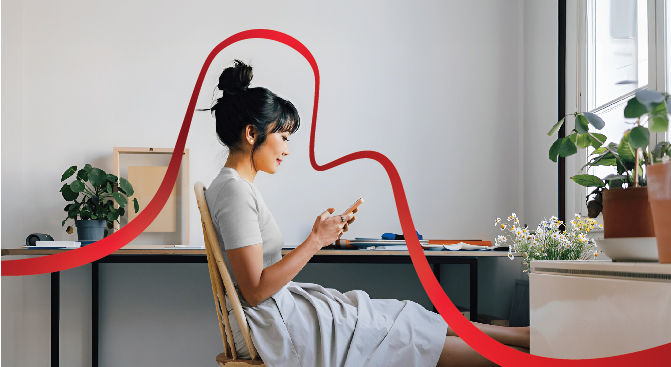
Breaking bad habits at work and work from home
Months into the pandemic, many of us have either settled into work from home arrangements or are back at the office now that lockdowns have eased in some places.
How are you adjusting to the new normal at your workplace—whether at the office or in your home? If you’re having a hard time, cut yourself some slack. This pandemic is stressful for everybody: along the way, we have adopted good as well as bad habits in our work routines.
That doesn’t mean though that you can’t do anything to make your life working at the office or at home even better. Here are some tips from the experts on how to be more productive in the new normal without getting burned out.
Improve health and focus
Working from home cuts down on a lot of stress related to commuting, traffic, and some expenses. However, there are bad work habits we develop whether we are working at home or the office. Such habits affect our health and work performance negatively.
Let’s identify and break these habits that compromise our health and work performance both at home or at the office:[1]
-
Sitting all day. Most employees spend their day at work sitting in front of their desk at the office. However, this can also happen to those of us who work from home. This can cause back pain and become a factor in weight gain, diabetes, and heart disease. Break this bad habit by standing up and walking around every few minutes per hour. You can also do body stretches. Don’t forget to be mindful of your posture as well.
-
Stress-eating. Whether we’re working at home or in the office, we can fall into a routine of mindless snacking as a coping mechanism for stress. This can be unhealthy when we consume high-calorie processed snacks that pack on the salts, fats, and artificial ingredients. The solution is to snack more mindfully: be aware when you get the urge to snack. Slow down, take a deep breath and drink some water first. When we’re stressed, we can easily mistake thirst for hunger. If you do really need to snack, choose healthy options like fruits, veggies, and snacks that are high in fiber and nutrition. If you work from home, keep ready-to-eat nutritious food in your fridge for easy access.
-
Social media distraction. Checking your social media every now and then while at work might be harmless but it can actually take a lot of time from accomplishing your real tasks. This tendency can increase if you work from home. Avoid this kind of temptation by taking a few breaths, having a quick chat with a co-worker or your companions at home, then going back to work right after.
-
Procrastination. Whether we’re working from home or at the office we should always do our best to meet deadlines. If you’re the type of person who starts work at the last minute, this can get you in trouble. Manage your time and workload by starting with a to-do list to organize your workday better.
-
Being late. We’ve seen memes about people who still manage to be late for an online video meeting even though they’re already working from home and not traveling to work. We get the humor, but in real-life being late for an online meeting is just as bad for everyone if the meeting was in person. Practice waking up an hour earlier than your usual time so you can start your day early, too. It would also help if you slept earlier. A complete sleep cycle will not be harder to wake up from!
-
Keep work and play separate. For those working from home, it helps to have a designated space for working. This means that your bed shouldn’t be where you work. Now is probably the time to invest in a proper desk. Having assigned spaces for work and for relaxing will help your mind keep the distinction between the two. This will also help avoid burnout as you won’t feel as if work is all you do at home.
What to do to break bad habits
Experts suggest that goals are easier to reach if they’re specific. After setting a specified goal, be sure to have practical ways to reach it.[2] For example, let’s say your goal is to stop the habit of being distracted by social media at work.
A practical way to achieve that is to lock your mobile phone in your desk drawer and only reach for it on your lunch break.
Do not expect instant results. Change is a process and requires effort and patience. You can achieve long-lasting change for yourself if you are self-motivated and optimistic.[3]
Furthermore, self-control is harder to achieve when we are under stress. Therefore, instead of relying on self-control, use the concept of rewards in achieving good habits.
-
Know your triggers. Figure out what triggers bad habits like procrastinating or stress eating. Reflect on what actions you do when you’re triggered so you can give yourself a sense of control or peace of mind. For example, do you binge eat whenever you’re stressed? Once you identify the trigger, you can come up with better ways to respond to the trigger in a healthy, productive manner.
-
Pay attention to how you feel when you do a bad habit. If you’re stress eating or when you procrastinate, how do you feel? By paying attention to how you feel whenever you do a bad habit, you can analyze what sort of reward or relief you get from it.
-
Replace the reward with a better one. This final step helps you assess a new greater and healthier reward for breaking a bad habit. For example, if unhealthy eating or procrastination helps you cope with anxiety at work, then replace them with healthier behaviors. Then when you practice the healthier response to anxiety, reward yourself. Either eat a healthy snack like fruit or pick another reward that isn’t food at all. This helps you replace bad habits with good ones.
Doing our jobs during a global health crisis can be tough: we are more stressed and more anxious whether we work from home or at the office. But you can still make work work for you if you are mindful of your personal habits while on the job. Be proactive about maintaining a work-life balance and it will help improve your physical and mental health.
---
References
[1] Blackman, S. (2014, December 12). 5 Unhealthy Workplace Habits to Break in 2015. Entrepreneur. https://www.entrepreneur.com/article/240841
[2] Harvard Health Publishing. (2019, August 2). Why it’s hard to change unhealthy behavior - and why you should keep trying - Harvard Health. Harvard Health; Harvard Health. https://www.health.harvard.edu/newsletter_article/why-its-hard-to-change-unhealthy-behavior-and-why-you-should-keep-trying
[3] Harvard Health Publishing. (2019, August 2). Why it’s hard to change unhealthy behavior - and why you should keep trying - Harvard Health. Harvard Health; Harvard Health. https://www.health.harvard.edu/newsletter_article/why-its-hard-to-change-unhealthy-behavior-and-why-you-should-keep-trying

